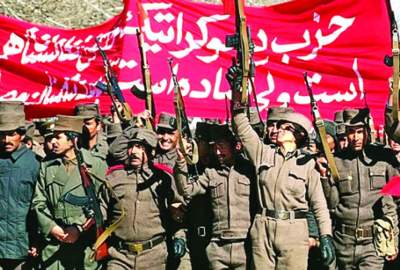Afghan president Hamid Karzai was in Pakistan on August 26 on a day-long trip to seek support for reconciliation with recalcitrant Taliban insurgents and move forward the stalled peace process in his war-torn country. Afghanistan is at a crucial juncture in its history and any misstep may push it back into the dark alley of civil war, just like after the withdrawal of the Russian forces in 1989. Next year is very important for Afghanistan for reasons of security and politics, as the U.S is planning to lead a reduction in troops by the end of the year, while the Afghan presidential election is also due in May. These incidents will hugely impact on the future of Afghanistan.
According to the Afghan constitution, Karzai cannot stand as he has already completed two terms in office. However, he wants to leave a permanent legacy of putting the country on a path to democratic peace and prosperity, and he seems to be in hurry.
Karzai's visit to Pakistan was important as Islamabad holds the key to realizing his grand dreams. He told media after key talks with Prime Minister Nawaz Sharif that he discussed the "issue of joint fight against extremism and reconciliation and peace building in Afghanistan." He said that he expected that Pakistan government will "facilitate and help in manner it can to the peace process in Afghanistan by providing an opportunity or platform for talks" between Afghanistan High Peace Council and Taliban.
Pakistan's premier spy agency Inter-Services Intelligence (ISI) is considered close to the Taliban. Their ties go back to the 1990s when ISI helped the rag-tag militants to take over Kabul and rule with vengeance till they were removed by U.S. forces in 2001 after 9/11. Most of the Taliban fighters and their leaders fled to Pakistan after the U.S. attack and remained in hiding till the situation turned in their favour after the U.S. blunders in Iraq after its occupation in 2003. As the US lost both credibility and moral authority to wage war on terror, the militants grabbed their guns and became active in Afghanistan-Pakistan border region. Their supporters, whether from Pakistani security agencies or outside, were relieved to see the Taliban finding their feet and taking on the super power of the world.
After more than a decade of ruthless fighting, it has dawned on the U.S. and the Afghan government that they cannot win a war against a shadowy enemy hiding in the mountains, so they started searching for a peaceful option.. Naturally, they looked towards Pakistan. But the situation was quite complex as various stakeholders started considering their influence on the future government. Karzai was anxious to take the lead in the peace process and started negotiation in secret with some of the militants. The U.S. and Pakistan disagreed and torpedoed this move by arresting deputy Taliban leader Mullah Abdul Ghani Barader from Karachi in 2010. The Afghan president was livid and demanded his release, which was politely refused by Islamabad. Washington was just happy as it was already tired of Karzai's shenanigans.
Meanwhile, Pakistan and the U.S. started wooing the Taliban for political reconciliation, which Karzai vehemently opposed. He also shot down the political office in Qatar by saying that it looked like a government in exile. The brinkmanship from the three sides has stalled the peace process and reconciliation in Afghanistan to the chagrin of Karzai who wants to solve the issue on an urgent basis before his retirement.
During his tour to Pakistan, Karzai discussed the issue of release of Mullah Barader and relocation of the Taliban office either to Saudi Arabia or Turkey. Pakistan is not opposed to either of the ideas but it wants to cement its interests before committing on anything. Islamabad's minimal list of national security interests demand that any future government in Kabul should not be ill-disposed towards it.
The issue for Karzai is that as well as keeping Pakistan happy, he also needs to keep the U.S. and countries like India on his side. He also needs to protect his own national interests. With these compelling narratives, the future of Afghanistan is fraught with dangers.
The only hopeful sign so far is the new government in Pakistan. Prime Minister Nawaz Sharif is keen to build economic ties with border countries. He is keenly following the Chinese model of the "peaceful neighbourhood" and made an offer to Karzai to join the common development efforts. But the problem for the Afghan leader is that without peace with the Taliban, any talk of development will be futile. (China.org)
According to the Afghan constitution, Karzai cannot stand as he has already completed two terms in office. However, he wants to leave a permanent legacy of putting the country on a path to democratic peace and prosperity, and he seems to be in hurry.
Karzai's visit to Pakistan was important as Islamabad holds the key to realizing his grand dreams. He told media after key talks with Prime Minister Nawaz Sharif that he discussed the "issue of joint fight against extremism and reconciliation and peace building in Afghanistan." He said that he expected that Pakistan government will "facilitate and help in manner it can to the peace process in Afghanistan by providing an opportunity or platform for talks" between Afghanistan High Peace Council and Taliban.
Pakistan's premier spy agency Inter-Services Intelligence (ISI) is considered close to the Taliban. Their ties go back to the 1990s when ISI helped the rag-tag militants to take over Kabul and rule with vengeance till they were removed by U.S. forces in 2001 after 9/11. Most of the Taliban fighters and their leaders fled to Pakistan after the U.S. attack and remained in hiding till the situation turned in their favour after the U.S. blunders in Iraq after its occupation in 2003. As the US lost both credibility and moral authority to wage war on terror, the militants grabbed their guns and became active in Afghanistan-Pakistan border region. Their supporters, whether from Pakistani security agencies or outside, were relieved to see the Taliban finding their feet and taking on the super power of the world.
After more than a decade of ruthless fighting, it has dawned on the U.S. and the Afghan government that they cannot win a war against a shadowy enemy hiding in the mountains, so they started searching for a peaceful option.. Naturally, they looked towards Pakistan. But the situation was quite complex as various stakeholders started considering their influence on the future government. Karzai was anxious to take the lead in the peace process and started negotiation in secret with some of the militants. The U.S. and Pakistan disagreed and torpedoed this move by arresting deputy Taliban leader Mullah Abdul Ghani Barader from Karachi in 2010. The Afghan president was livid and demanded his release, which was politely refused by Islamabad. Washington was just happy as it was already tired of Karzai's shenanigans.
Meanwhile, Pakistan and the U.S. started wooing the Taliban for political reconciliation, which Karzai vehemently opposed. He also shot down the political office in Qatar by saying that it looked like a government in exile. The brinkmanship from the three sides has stalled the peace process and reconciliation in Afghanistan to the chagrin of Karzai who wants to solve the issue on an urgent basis before his retirement.
During his tour to Pakistan, Karzai discussed the issue of release of Mullah Barader and relocation of the Taliban office either to Saudi Arabia or Turkey. Pakistan is not opposed to either of the ideas but it wants to cement its interests before committing on anything. Islamabad's minimal list of national security interests demand that any future government in Kabul should not be ill-disposed towards it.
The issue for Karzai is that as well as keeping Pakistan happy, he also needs to keep the U.S. and countries like India on his side. He also needs to protect his own national interests. With these compelling narratives, the future of Afghanistan is fraught with dangers.
The only hopeful sign so far is the new government in Pakistan. Prime Minister Nawaz Sharif is keen to build economic ties with border countries. He is keenly following the Chinese model of the "peaceful neighbourhood" and made an offer to Karzai to join the common development efforts. But the problem for the Afghan leader is that without peace with the Taliban, any talk of development will be futile. (China.org)
Source : Afghan Voice Agency (AVA), International Service







